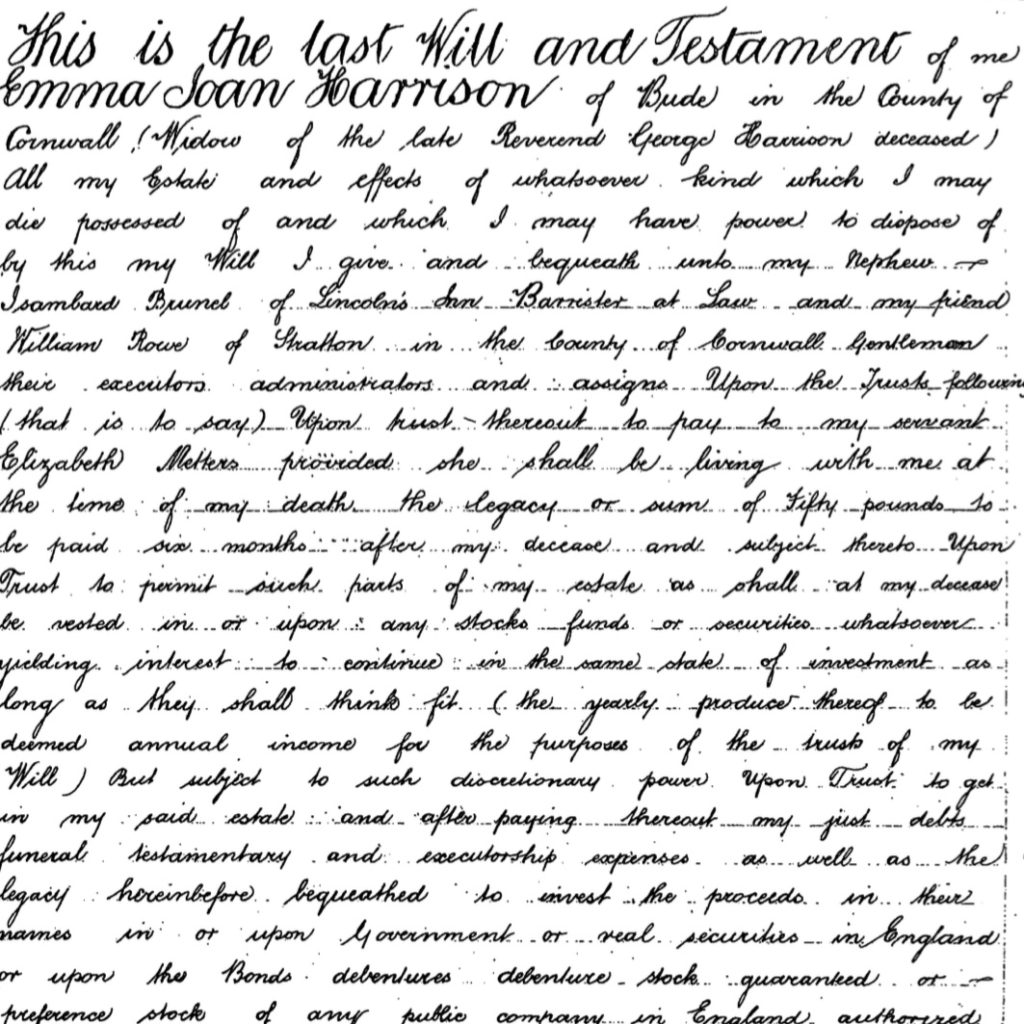Emma Joan Brunel was the sister of civil engineer Isambard Kingdom Brunel. However, little is actually know about her. She is merely a footnote in the numerous biographies about her famous brother. But the few facts that I was able to unearth suggest that she was an extraordinary woman in her own right.
Emma was born in Westminster on 6th April 1803 and baptised at St Margaret’s Church, which is next to Westminster Abbey. Now comes the interesting bit:
She got married on 31st October 1836 at the age of 33 and had her one and only child when she was nearly 41 years old. To me these things are truly remarkable for a woman of the 19th century. Her husband, The Rev George Harrison (not to be confused with a certain musician from Liverpool), was a widower but only three years her senior. Unfortunately, I haven’t been able to find any records about his first wife yet or how and when he and Emma met. But I’ll keep digging.
Interestingly, Emma’s father Marc was supposed to become a clergy himself and his own father had tried everything in his power to push him into this profession. But Marc refused and became an engineer instead, which definitely came in handy for Isambard. There are a few remarks in a biography about Marc that he did not care much for religionists, which indicates that Emma chose her husband herself. It also makes me wonder if spirituality might have given her a sense of belonging/purpose in general. She didn’t seem to have had any personal interest in engineering like her older sister Sophia and might have felt excluded from the mind-boggling conversations about her father’s (and brother’s) ground-breaking work at times. Emma was also a middle child, whose talents tend to be overlooked anyway.
I’ve recently got my hands on a letter of condolences that Emma wrote in 1831, which confirms that she was indeed a spiritual person. She knew the Bible so well that she quotes it by heart several times in the letter. Judging by the way she comforts her friend in her bereavement, I’m sure that being a vicar’s wife was something that Emma must’ve really enjoyed. It also seemed to have been a very comfortable life. When she died on 25th October 1883 at the age of 80, her personal estate was worth 990 pounds, 14 shillings and 9 pence.
Emma’s interest in people as well as her sense for right & wrong makes her the perfect amateur sleuth for my story. As a spinster she also had a lot of time on her hands while the Thames Tunnel was built from 1825 onwards, which is an important setting in my crime novel. But there’s something else that Emma brings to the table: A strong inner conflict.
Four years prior to the foundation-stone laying ceremony of the Thames Tunnel, Emma’s father went bankrupt and was arrested for debt. Her mother accompanied him into King’s Bench Prison in Southwark, which was not far from the infamous Marshalsea Prison. At that time Isambard was in France for his education and Emma’s sister Sophia lived with her husband in Lambeth.
But what happened to Emma?
It seems logical that she either would have joined her parents in prison or lived with her sister/other relatives. But according to a biography about her father, Emma remained at the family home in Chelsea (together with a trusted maid) and looked after the house in her parents’ absence. This suggests that she was someone, who was considered to be capable of coping on her own in a crisis. But since Emma had only turned eighteen that year, this situation must have been quite a traumatic experience for her. As Dickens describes it so vividly in his novel ‘Little Dorrit’, being sent to debtor’s prison came with a huge stigma and the uncertainty of not knowing when the prisoner would be released.
Emma’s father was lucky. He only had to spend three months in prison before The Duke of Wellington/the British Government arranged for his debts to be paid.
In my novel Emma is still affected by the aftermath of these events, which both motivates and hinders her during her investigations.
This is of course only a fictionalised version of the real Emma Joan Brunel. But it allows me to give her a voice, which is the main reason why I have decided to make this extraordinary woman an amateur sleuth.
Happy International Women’s Day!
Andrea Vasel (Pen name: Rea Rhine), Tour Guide & Museum Ambassador (This blog post has also been published on: https://rearhine.wordpress.com/2024/03/08/who-was-emma-brunel-and-why-have-i-decided-to-make-her-an-amateur-sleuth/)

